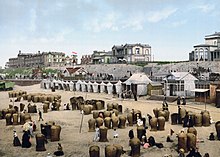Scheveningen
Scheveningen (Dutch pronunciation: [ˈsxeːvənɪŋə(n)] ⓘ) is one of the eight districts of The Hague, Netherlands, as well as a subdistrict (wijk) of that city.
In 1818, Jacob Pronk constructed a wooden building on a dune near the sea, from where people could bathe from four separate rooms.
The village attracted a number of Dutch artists over the centuries, who painted the bomschuiten drawn up on the beach, or fishermen at work in the North Sea.
For instance, it had its own football club, playing in the highest Dutch division (its name was "Scheveningen Holland Sport").
When the Netherlands ratified the Treaty of Strasbourg on 1 September 1974,[9] Veronica applied for legal status and became the VOO, Caroline moved anchorage to the English coast, and RNI closed down.
Since the 1970s the population of the original Scheveningen changed as the fishing industry declined and some artists and professionals moved in.
Some still remain and have been protected by the authorities, including some of the original 'hofjes', in an enclosed area with small row houses on each side.
Slobodan Milošević, the 3rd president of Serbia and Montenegro was found dead in his prison cell on 11 March 2006 while he was being held in the UN war crimes tribunal's detention center in Scheveningen.
Some common 'typical Scheveningen' family names are, for example, Bal, Dijkhuizen, Groen, Korving, Den Heijer, Knoester, De Niet, Plugge, Pronk, Rog, Spaans, Taal, Toet, Vrolijk, Zuurmond and Van der Zwan.
During the tournament, the variation was played by several players, for instance by the future Dutch world chess champion Max Euwe.








